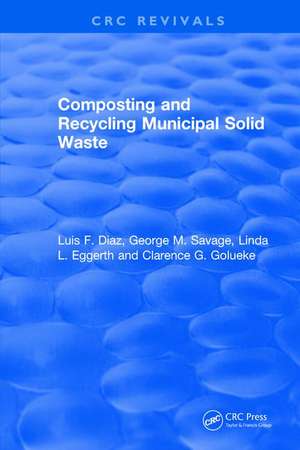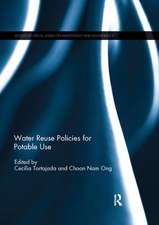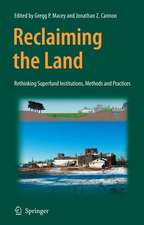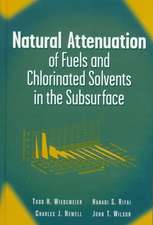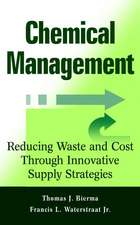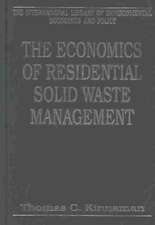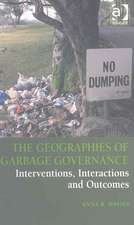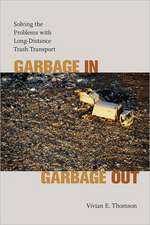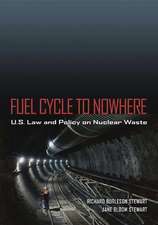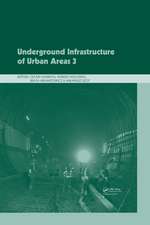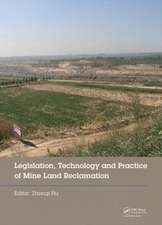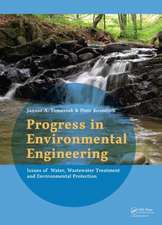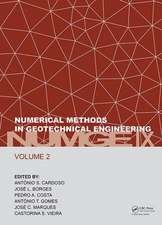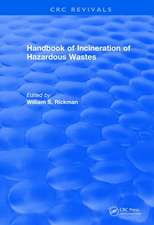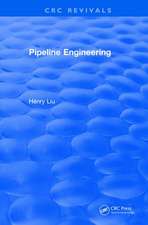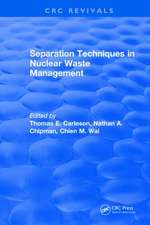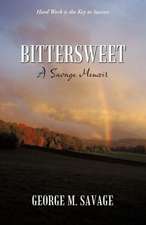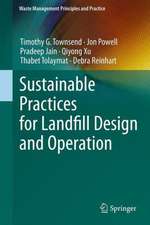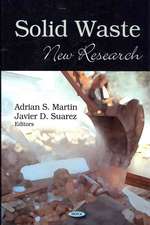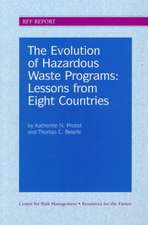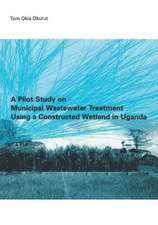Composting and Recycling Municipal Solid Waste: CRC Press Revivals
Autor Luis F. Diaz, Clarence G. Golueke, George M. Savage, Linda L. Eggerthen Limba Engleză Hardback – 27 iul 2017
Composting and Recycling Municipal Solid Waste provides essential information needed by solid waste professionals, consultants, regulators, and planners to arrive at rational decisions regarding available economic and technological resources for MSW composting and recycling.
| Toate formatele și edițiile | Preț | Express |
|---|---|---|
| Paperback (1) | 461.03 lei 6-8 săpt. | |
| CRC Press – 29 ian 2019 | 461.03 lei 6-8 săpt. | |
| Hardback (1) | 1544.82 lei 6-8 săpt. | |
| CRC Press – 27 iul 2017 | 1544.82 lei 6-8 săpt. |
Din seria CRC Press Revivals
-
 Preț: 227.05 lei
Preț: 227.05 lei -
 Preț: 369.73 lei
Preț: 369.73 lei -
 Preț: 369.73 lei
Preț: 369.73 lei - 15%
 Preț: 461.03 lei
Preț: 461.03 lei - 15%
 Preț: 461.03 lei
Preț: 461.03 lei - 15%
 Preț: 93.77 lei
Preț: 93.77 lei -
 Preț: 244.94 lei
Preț: 244.94 lei - 18%
 Preț: 1054.71 lei
Preț: 1054.71 lei - 24%
 Preț: 358.70 lei
Preț: 358.70 lei - 13%
 Preț: 338.33 lei
Preț: 338.33 lei - 15%
 Preț: 585.27 lei
Preț: 585.27 lei - 18%
 Preț: 1000.27 lei
Preț: 1000.27 lei -
 Preț: 322.97 lei
Preț: 322.97 lei -
 Preț: 469.34 lei
Preț: 469.34 lei - 13%
 Preț: 338.33 lei
Preț: 338.33 lei -
 Preț: 469.34 lei
Preț: 469.34 lei -
 Preț: 469.34 lei
Preț: 469.34 lei - 46%
 Preț: 203.95 lei
Preț: 203.95 lei -
 Preț: 322.97 lei
Preț: 322.97 lei - 15%
 Preț: 545.64 lei
Preț: 545.64 lei - 5%
 Preț: 1032.66 lei
Preț: 1032.66 lei - 23%
 Preț: 456.63 lei
Preț: 456.63 lei - 35%
 Preț: 1169.12 lei
Preț: 1169.12 lei - 15%
 Preț: 540.06 lei
Preț: 540.06 lei - 15%
 Preț: 461.03 lei
Preț: 461.03 lei -
 Preț: 489.00 lei
Preț: 489.00 lei - 36%
 Preț: 1681.14 lei
Preț: 1681.14 lei -
 Preț: 322.97 lei
Preț: 322.97 lei -
 Preț: 469.34 lei
Preț: 469.34 lei - 5%
 Preț: 1537.37 lei
Preț: 1537.37 lei - 15%
 Preț: 461.03 lei
Preț: 461.03 lei - 26%
 Preț: 1215.08 lei
Preț: 1215.08 lei - 15%
 Preț: 698.17 lei
Preț: 698.17 lei -
 Preț: 469.34 lei
Preț: 469.34 lei -
 Preț: 469.34 lei
Preț: 469.34 lei - 15%
 Preț: 461.03 lei
Preț: 461.03 lei - 16%
 Preț: 216.07 lei
Preț: 216.07 lei - 15%
 Preț: 461.36 lei
Preț: 461.36 lei - 50%
 Preț: 912.50 lei
Preț: 912.50 lei - 18%
 Preț: 1544.82 lei
Preț: 1544.82 lei - 26%
 Preț: 1018.41 lei
Preț: 1018.41 lei
Preț: 1544.82 lei
Preț vechi: 1883.93 lei
-18% Nou
Puncte Express: 2317
Preț estimativ în valută:
295.59€ • 309.46$ • 244.59£
295.59€ • 309.46$ • 244.59£
Carte tipărită la comandă
Livrare economică 05-19 aprilie
Preluare comenzi: 021 569.72.76
Specificații
ISBN-13: 9781138505667
ISBN-10: 1138505668
Pagini: 318
Ilustrații: 10 Tables, black and white
Dimensiuni: 156 x 234 x 19 mm
Greutate: 0.45 kg
Ediția:1
Editura: CRC Press
Colecția CRC Press
Seria CRC Press Revivals
Locul publicării:Boca Raton, United States
ISBN-10: 1138505668
Pagini: 318
Ilustrații: 10 Tables, black and white
Dimensiuni: 156 x 234 x 19 mm
Greutate: 0.45 kg
Ediția:1
Editura: CRC Press
Colecția CRC Press
Seria CRC Press Revivals
Locul publicării:Boca Raton, United States
Public țintă
ProfessionalCuprins
Introduction. Storage and Collection. Waste Characterization. Processing. Recycling-MRFs. Use of Organic Matter as a Soil Amendment. Composting. Products and Markets. Biogasification. Integrated Waste Management.
Notă biografică
Luis F. Diaz received his Doctorate in Environmental Engineering from the University of California at Berkeley. He has been involved in the field of waste management for over 19 years. Dr. Diaz has conducted numerous waste management studies, technical and economic assessments of refuse processing systems, environmental analyses of resource recovery system, and marketing studies for materials and energy recovering from residues. He has also carried out a large number of projects involving the biological conversion of organic matter into useful products. Dr. Diaz has conducted technical, economic, environmental, and institutional assessments of solid waste management systems for state and federal agencies, private industries, and international lending institutions, as well as governments in Asia, Africa, Europe, and Latin America.
George M Savage received his M.S. in Mechanical Engineering from the University of California at Berkeley. He has more than 20 years of experience in the field of solid waste management. Mr. Savage has participated in a wide variety of projects, including technical and economic feasibility studies of waste management alternatives, design, and construction of processing facilities, field testing of collection and processing systems, development of test methods and performance criteria in the field of solid waste management, waste characterization studies, and market developments.
Linda L. Eggerth received her degree in Business Management from St. Mary’s College in Moraga, California. She has been involved in the field of waste management for over 17 years. Ms Eggerth has both directed and participated in a large variety of waste management and resources recovery projects and has developed an international expertise in several areas including preparation of request for proposals, financial and economic analysis of waste collection and processing alternative, marketing of recovered materials, and the development of guidelines for the classification of compost, She has played key roles in assisting communities in the implementations of recycling and composting programs, and has participated in international projects involving material and energy recovery from solid wastes. She has authored and co-authored several articles and technical reports in the field of solid waste management and is regularly requested to make presentations at seminars and conferences.
Clarence G. Golueke received his Doctorate in Botany from the University of California at Berkeley. Dr. Gouleke has over 40 years of experience in the fields of solid and liquid waste management. He is an internationally recognised authority in the biological conversion of solid wastes. Since the early 1950s, he has been continually involved in all aspects of the composting and anaerobic digestion of municipal solid wastes, agricultural residues, industrial wastes, and various types of sludges. Dr. Golueke was one of the first scientists to delineate the basic parameters for the application of composting in the field of solid waste management. He has provided expert advice to national and international organizations in all aspects of solid waste management. Dr Golueke is a member off editorial boards for several journals dealing with waste management and environmental control. He has published serval books and more than 200 articles and technical reports in the fields of solid and liquid waste management.
George M Savage received his M.S. in Mechanical Engineering from the University of California at Berkeley. He has more than 20 years of experience in the field of solid waste management. Mr. Savage has participated in a wide variety of projects, including technical and economic feasibility studies of waste management alternatives, design, and construction of processing facilities, field testing of collection and processing systems, development of test methods and performance criteria in the field of solid waste management, waste characterization studies, and market developments.
Linda L. Eggerth received her degree in Business Management from St. Mary’s College in Moraga, California. She has been involved in the field of waste management for over 17 years. Ms Eggerth has both directed and participated in a large variety of waste management and resources recovery projects and has developed an international expertise in several areas including preparation of request for proposals, financial and economic analysis of waste collection and processing alternative, marketing of recovered materials, and the development of guidelines for the classification of compost, She has played key roles in assisting communities in the implementations of recycling and composting programs, and has participated in international projects involving material and energy recovery from solid wastes. She has authored and co-authored several articles and technical reports in the field of solid waste management and is regularly requested to make presentations at seminars and conferences.
Clarence G. Golueke received his Doctorate in Botany from the University of California at Berkeley. Dr. Gouleke has over 40 years of experience in the fields of solid and liquid waste management. He is an internationally recognised authority in the biological conversion of solid wastes. Since the early 1950s, he has been continually involved in all aspects of the composting and anaerobic digestion of municipal solid wastes, agricultural residues, industrial wastes, and various types of sludges. Dr. Golueke was one of the first scientists to delineate the basic parameters for the application of composting in the field of solid waste management. He has provided expert advice to national and international organizations in all aspects of solid waste management. Dr Golueke is a member off editorial boards for several journals dealing with waste management and environmental control. He has published serval books and more than 200 articles and technical reports in the fields of solid and liquid waste management.
Descriere
Composting and Recycling Municipal Solid Waste is a comprehensive guide that identifies, describes, explains, and evaluates the options available when composting and recycling municipal solid waste (MSW). The book begins with an introductory chapter on the nature of MSW and the importance of solid waste management programs and resource recovery. Chapter 2 discusses MSW storage and collection, with emphasis on recyclables. Chapter 3 examines issues involved in determining the quantity, composition, and key physical characteristics of the MSW to be managed and processed. The book's other chapters cover topics such as the steps required for processing MSW for material recovery, the use of uncomposted organic matter as a soil amendment, composting and use of compost product, the marketing of recyclables, biogasification, and integrated waste management.
